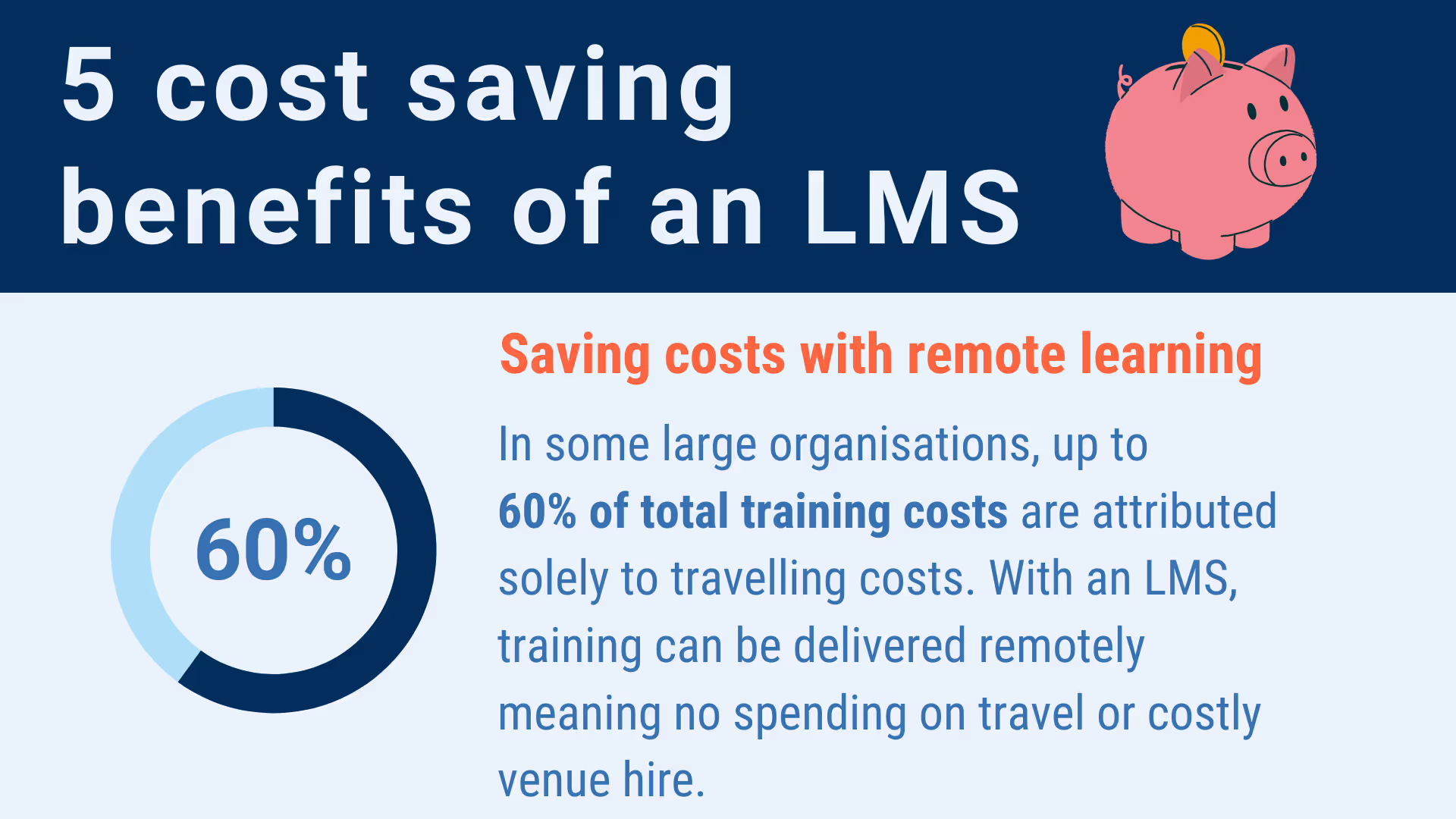


Key Takeaways
- Centralized Learning Hub: LMS creates a unified portal for easy access to learning materials, streamlining content management and updates efficiently.
- Cost-Efficient Training: Reduces expenses from traditional training by eliminating travel costs and enabling scalable, online programs for organizations globally.
- Personalized Learning Paths: Customizes learning experiences to individual needs, enhancing engagement and performance through tailored content and flexible pacing.
In a world where knowledge is an essential asset, it is possible to achieve a lot with the help of proper tools best learning management systems and technologies. LMS stands for Learning Management System and is simply revolutionary in delivering and managing educational content.
In addition, they make their work easier by reducing the amount of time spent on administration while offering a user friendly, personalized approach that learners prefer.
Moreover, Brandon Hall Group studies show the correlation between LMS and training and development, where 68% of organisations affirm that LMS has a positive effect on new skills and knowledge on the subject. They emphasize that a serious commitment to employee learning and development can significantly enhance the effectiveness of an LMS in meeting business goals. They are so much more than an online course system, as what they do is revolutionize the concept of learning for the digital age in its many advantages in terms of its foundation of retention, accessibility remote personalized learning experiences, communication, and assessments.
10 Benefits Of A Learning Management System (LMS)
In this section, it is also necessary to discuss how the use of the Learning Management System (LMS) can be helpful for both educational institutions and businesses. Right from facilitating effective learning to supporting administrative operations, there are ample LMS benefits to explore.
Below are the ten advantages of LMS that make it vital in the modern online learning space.
1. Centralised Learning Hub
LMS serves as a centralised portal for all learning needs as it encompasses all learning material, and multimedia content such as documents, videos, and assessments. Similarly, the learners do not have to go physically to their mail inbox or browse through numerous other sites to get the content they want to read.
This centralized system is also an important top learning management systems because learners can locate all the online learning and materials they require and easily access them at will, making the system more systematic. This good learning management system also helps organizations in managing their online training courses, and as an added advantage helps in the monitoring of the course content to make certain updates when necessary.
2. Improved Learner Engagement
LMS contains elements such as quizzes, discussions, videos, and games to improve the experience of the learner. In this way, they allow for the collaboration of multimedia and active components to create a more interesting and stimulating learning process.
Reward systems, including point systems, badges, and leaderboards help learners finish the course and make students participate actively as well as provide students with a sense of accomplishment during the process. These aspects assist the courses in helping the learners retain the vital information being passed and also keep the learners more occupied in the course content.
3. Cost-Effective Online Training

An LMS minimizes some of the many costs that occur in traditional face-to-face training, for instance, venue rental, transportation, and physical handouts. Another advantage of training that is conducted online is that it can be used more than once depending on the number of people the organisation has.
It also saves money in training, especially for large organizations and those with teams located in different geographical locations, for instance, no traveling and accommodation expenses are needed. Further, since there is no such requirement for material resources, more amounts of money can be invested in other segments of the business and other software development process.
4. Better Tracking and Reporting of Learner Progress
LMS offers complete record and report functions that enable instructors and administrators to monitor learner’s performance. From the status of the course completion to the lack of specific knowledge in learners, overall monitoring of each learner is possible with the help of the LMS.
Reports can reveal which courses are trending and which courses or learners may require more learner attention. These outcomes aid organizations in the fine-tuning of their training regimes while providing an avenue for ascertaining learning outcomes for new employees.
5. Scalable Learning Solutions
An LMS is created to handle increasing learning requirements, so it is versatile for any organization. LMS thus can support from a small training session for a few people to a large training for, for instance, a whole company’s global workforce.
It is easy to move employee training programs to other software to accommodate new users; learning materials can be developed for large training courses or individual training programs. Such scalability enables businesses to maintain sound training sessions despite the growth in the size of the training program.
6. Personalized Learning Paths
LMS platforms also make it possible to set the learner’s progress, learning style, and skill level and prescribe the type of learning that is required. This implies that learners get to set their rate, exclude unnecessary information, and concentrate on difficult sections.
An LMS platform allows organizations to tailor learning experiences based on individual needs, fostering better engagement and outcomes.
Champ for Life, founded by five-time PGA champion Indrajit Bhalotia, leveraged EdisonOS to create a customized curriculum that reduced academic pressure for young athletes.
Through this personalized approach, students at Champ for Life could focus on critical academic areas without compromising their sports training. By reducing academic pressure, the platform empowered over 750 students and teachers from across academies and NGOs to thrive both in the classroom and on the field. This innovative integration of learning and passion demonstrates how personalized learning paths can transform traditional education models, supporting diverse talents and ambitions.
7. Time and Efficiency Savings
An LMS helps to manage student enrollment, and course scheduling and remind the learners of their scheduled courses, cutting down a lot of time that would have been spent on such tasks. This results in better efficiency of instructors and HR teams that are devoted to things that contribute real value to the course, content, and learners.
It also eliminates the time that would have been taken to take time zones to assess the learners and provide feedback, making the learning process more efficient and allowing learners to access materials at their own pace.
8. Continuous Learning Processes
An LMS helps bring about standardization since the training delivery to each learner is uniform across all the users’ environments. This is particularly useful for compliance training or other programs that need to be run across the organization and must be consistent each time they are delivered.
From an employee or student perspective, nothing is stopping one location from being located in Cambridge and still accessing the internet access to work remotely the same materials and assessments as their counterparts in India, which will go a long way toward ensuring that everyone will be assessed to the same standard.
9. Compliance and Certification Management for Employee Training
In the case of security-sensitive industries, LMS platforms also assist in guaranteeing compliance with the required training and certification. There is tracking of all certifications and one can be notified when the certifications are expiring hence able to renew them.
Certification, top learning management systems, and tools in LMS platforms also assist in creating and issuing certificates on completion of the course, saving time and making it easy and time-saving.
10. Easy Content Updates
With an LMS, updating training materials becomes seamless and efficient. Najeeb Shaik, from The Edge Learning Center, shared how EdisonOS transformed their outdated paper-based system into a flexible, powerful tool customizable platform. He stated, "EdisonOS transformed our outdated paper system with its flexible, customizable platform. Love it!"
This flexibility ensures that course updates can be made centrally, and learners instantly access the latest version without needing manual distribution. Industries like healthcare and finance greatly benefit from this feature, as compliance and regulations often necessitate frequent updates.
Conclusion
“The only way to do great work is to love what you do.” – Steve Jobs
As technology continues to evolve, the role of Learning Management Systems becomes even more crucial in shaping the future of education and corporate training. With the rapid advancements in digital tools and the increasing demand for flexible, scalable learning environments, an LMS provides an indispensable solution while delivering personalized learning experiences.
In an era where continuous learning is essential for success, the benefits of LMS go beyond convenience and efficiency. They drive innovation by streamlining content delivery, improving learner outcomes, and promoting a culture of self-directed learning.
As businesses and educational institutions adapt to the digital age, a fully-featured management systems not only enhances learning experiences but also ensures that learners are equipped with the skills needed to thrive in an increasingly complex world.

Tutors Edge by EdisonOS
in our newsletter, curated to help tutors stay ahead!
Tutors Edge by EdisonOS
Get Exclusive test insights and updates in our newsletter, curated to help tutors stay ahead!











.png)
.webp)
